
Mob films document the rise, infiltration, or gradual fall of organized crime families and institutions. For police detective Bobby Belucci (Emile Hirsch) of Danny A. Abeckaser’s newest indie crime thriller, Inside Man, he is dead set on infiltrating the ill-famed DeMeo crew. But, in a world of shifting power dynamics and endless blood splatter, Bobby will have to pay a steep price to stay alive.
The year is 1983, and the film opens on the streets of Brooklyn, New York. Bobby is parked outside Gemini Lounge, a bar that the DeMeo crew frequents often. A close-up of an interior rearview mirror reflects Bobby’s contemplative gaze. The detective’s reason for scouting the bar has yet to be disclosed. Then, suddenly, Bobby is haunted by memories of partaking in violent acts, providing an inkling of his enfeebled morality.
The film goes back to one year earlier when Bobby comes home one day to find his wife, Mary (Ashley Greene), cheating. “I decided to redecorate my kitchen,” Bobby mockingly says via voice-over as he starts savagely beating the boyfriend. Abeckaser conveys the gravity of this moment through shuddering movements, fast cutting, and the discernible shock that befalls Mary and Bobby.
Expectedly, this incident didn’t look good for the department, so Bobby was demoted to a desk job, and his wife no longer wanted to be with him. Bobby is in a rough spot, but sometimes life has a funny way of putting you in a situation where you can prove yourself.
One night, Bobby is drinking his sorrows away when he witnesses a stranger attacking local drug dealer Chris Rosenberg (Jake Cannavale). Bobby steps in and, channeling all his pent-up ire attacks the stranger. Chris offers his respect, but what gauges Bobby’s interest is the realization that Chris has connections to the DeMeo crew. So, after convincing his captain (Bo Dietl) to assist him in taking down DeMeo’s entire operation, the disgraced detective goes undercover.

“…in taking down DeMeo’s entire operation, the disgraced detective goes undercover.”
Taking inspiration from mob movies like Donnie Brasco, The Departed, and Goodfellas, Inside Man is a vastly familiar yet entertaining contribution to the mafia subgenre. In an enjoyably caustic and self-assured performance, Hirsch is the standout, narrating sporadically throughout with a fittingly flippant tone that adds nuggets of levity. At the same time, Hirsch communicates through his posture that Bobby is alarmingly volatile and whose loyalties could shift at any moment it seems like.
Abeckaser gives the best supporting performance as the enigmatic and ruthless crime boss, Roy DeMeo (Abeckaser). When Bobby walks in and meets eyes with Roy, Abeckaser emanates fear and dominance as he neatly slices meat (alluding to the crew’s murderous proclivities). From that moment on, Inside Man kicks into high gear as Bobby rises in the ranks. In another memorable scene, a significantly more discreet Hirsch gives a disturbing monologue that either reveals a hidden truth about Bobby or speaks to his commitment to the cause.
On a separate note, Inside Man does have a period-accurate set and costume design. The Gemini Lounge, serving as a meet-up point for criminals, feels very quaint in the emphasis on diamond designs, lamps, and rectangular wood panels.
The scenes between Bobby and Mary aren’t terribly necessary, especially a subsequent act of aggression that Bobby precipitates while in Mary’s company. Lucy Hale comes aboard as a Gemini Lounge bartender who can or cannot be trusted. Although Hale gives a good performance, the direction taken with her character is inadequate, considering the telling scenes we get with her.
Despite being based on true events, one could just enjoy Abeckaser’s Inside Man for what it is: a thrilling and diverting low-budget crime thriller with a committed Hirsch at the forefront of the operation.
For more information about Inside Man, visit the Wild Seven Films official website.

"…thrilling and diverting..."



Very well acted!An intense movie experience,that really holds your attention